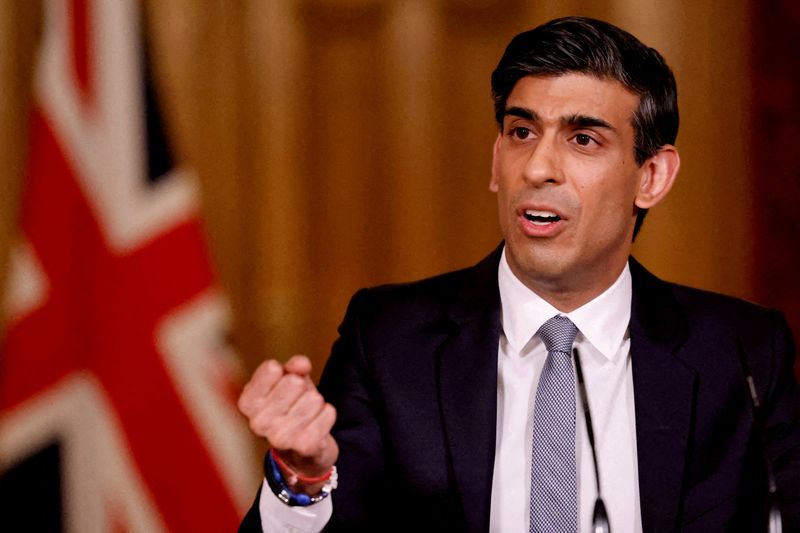By William Schomberg
LONDON (Reuters) - British finance minister Rishi Sunak must decide next week whether to spend billions of pounds more to ease the growing cost-of-living squeeze for households and businesses as inflation soars higher.
Sunak, who is due to deliver a budget update on Wednesday, wants to steer the public finances of the world's fifth-biggest economy back to normality after a COVID spending surge which pushed government borrowing to its highest ever in peacetime.
But fast-rising inflation - which looks on course to top 8% after Russia's invasion of Ukraine - has led to calls for Sunak to dig into the public coffers again and provide more emergency support.
The cost-of-living squeeze - which is also being driven by higher Bank of England interest rates - is set to overshadow his plans to address the longer-term challenge of fixing Britain's weak productivity record when he makes his Spring Statement.
Paul Johnson, director of the Institute for Fiscal Studies think tank, said Sunak faced a huge judgment call about whether to protect households from the energy price surge.
"If he doesn't, then many on moderate incomes will face the biggest hit to their living standards since at least the financial crisis," Johnson said. "If he does, then there will be another big hit to the public finances."
The IFS estimates Sunak would have to spend a further 22 billion pounds ($29 billion) if he wanted to restore the real value of the energy price support for households that he promised only last month, and to maintain the real-terms size of public-sector pay rises he announced in his October budget.
Britain's finance ministry says it has already promised direct cost-of-living support worth more than 20 billion pounds for this year and next.
OTHER COUNTRIES HAVE RESPONDED
Britain's debt interest bill for next year is also likely to increase by a similar amount, according to some estimates.
Around a quarter of British government borrowing pays interest that is tied to the rate of retail price inflation
Britain's borrowing has come down fast from 15% of gross domestic product at the height of the pandemic to about half of that in the tax year just ending, and Sunak has an estimated 20-30 billion pounds in wiggle room within his fiscal rules.
But analysts at bank Investec said Sunak might have to raise tax revenues to fund any new relief package for households.
"A 'windfall' levy on oil and gas producing companies would be one possibility. Another would be to do nothing for now and to defer a decision until later in the year," the analysts said.
Other governments have responded to the latest surge in energy prices. France and Sweden will subsidise automotive fuel costs. Germany and Italy are considering similar plans.
Businesses are also demanding support measures which range from the suspension of April's social security increase to more tax breaks to encourage business investment.
Sunak last month outlined his strategy for giving Britain's economy a productivity boost via tax incentives for investment in equipment and in research and development.
That could help boost Britain's sluggish economic growth over the longer term and allow Sunak to cut taxes, something many members of his Conservative Party demand.

At the moment, the government's tax take is set to reach its highest since the 1950s after Sunak announced an increase in social security contributions - that he has insisted will still start in April - and a big hike in corporation tax in 2023.
($1 = 0.7631 pounds)